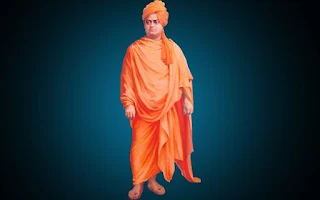Swami Vivekananda
(1863-1902)
Master Vivekananda's rousing character was notable both in India and in America during the last decade of the nineteenth century and the principal decade of the 20th. The obscure priest of India unexpectedly jumped into acclaim at the Parliament of Religions held in Chicago in 1893, at which he addressed Hinduism. His immense information on Eastern and Western culture just as his profound otherworldly knowledge, fervid expressiveness, splendid discussion, expansive human compassion, beautiful character, and attractive figure made a powerful appeal to the numerous kinds of Americans who interacted with him. Individuals who saw or heard Vivekananda even when actually esteem his memory after a pass of the greater part a century.
In America Vivekananda's main goal was the understanding of India's otherworldly culture, particularly in its Vedantic setting. He additionally attempted to advance the strict cognizance of the Americans through the levelheaded and humanistic lessons of the Vedanta reasoning. In America he turned into India's otherworldly envoy and argued articulately for better comprehension among India and the New World to make a solid blend of East and West, of religion and science.
In his own homeland Vivekananda is viewed as the loyalist holy person of current India and an inspirer of her lethargic public awareness, To the Hindus he lectured the ideal of a strength-giving and man-production religion. Administration to man as the noticeable appearance of the Godhead was the exceptional type of love he upheld for the Indians, given as they were to the customs and fantasies of their antiquated confidence. Numerous political heads of India have freely recognized their obligation to Swami Vivekananda.
The Swami's central goal was both public and worldwide. An admirer of humankind, he endeavored to advance harmony and human fellowship on the otherworldly establishment of the Vedantic Oneness of presence. A spiritualist of the greatest request, Vivekananda had an immediate and natural experience of Reality. He got his thoughts from that unfailing wellspring of intelligence and regularly introduced them in the soulstirring language of verse.
The regular propensity of Vivekananda's brain, similar to that of his Master, Ramakrishna, was to take off over the world and neglect itself in thought of the Absolute. Yet, another piece of his character drained at seeing human experiencing in East and West indistinguishable. It may create the impression that his psyche only here and there discovered a state of rest in its swaying between examination of God and administration to man. Nevertheless, he picked, in acquiescence to a higher call, administration to man as his central goal on earth; and this decision has charmed him to individuals in the West, Americans specifically.
Over the span of a short existence of 39 years (1863-1902), of which just ten were dedicated to public exercises and those, as well, amidst intense actual languishing he left over successors his four works of art: Jnana-Yoga, Bhakti-Yoga, Karma-Yoga, and Raja-Yoga, which are all extraordinary compositions on Hindu way of thinking. Also, he conveyed incalculable talks, composed enlivened letters in his own hand to his numerous companions and trains, made various sonnets, and went about as otherworldly manual for the numerous searchers, who came to him for guidance. He additionally coordinated the Ramakrishna Order of priests, which is the most exceptional strict association of present day India. It is given to the engendering of the Hindu otherworldly culture in the Swami's local land, yet in addition in America and in different pieces of the world.
Master Vivekananda once talked about himself as a "consolidated India." His life and lessons are of limitless worth toward the West for a comprehension of the psyche of Asia. William James, the Harvard logician, considered the Swami the "paragon of Vedantists." Max Muller and Paul Deussen, the popular Orientalists of the nineteenth century, held him in certifiable regard and warmth. "His words," composes Romain Rolland, "are extraordinary music, phrases in the style of Beethoven, mixing rhythms like the walk of Handel tunes. I can't contact these platitudes of his, dissipated as they are through the pages of books, at thirty years' distance, without getting a rush through my body like an electric shock. Furthermore, what shocks, what transports, more likely than not been created when in consuming words they gave from the lips of the legend!''
Thank you...!






0 Comments